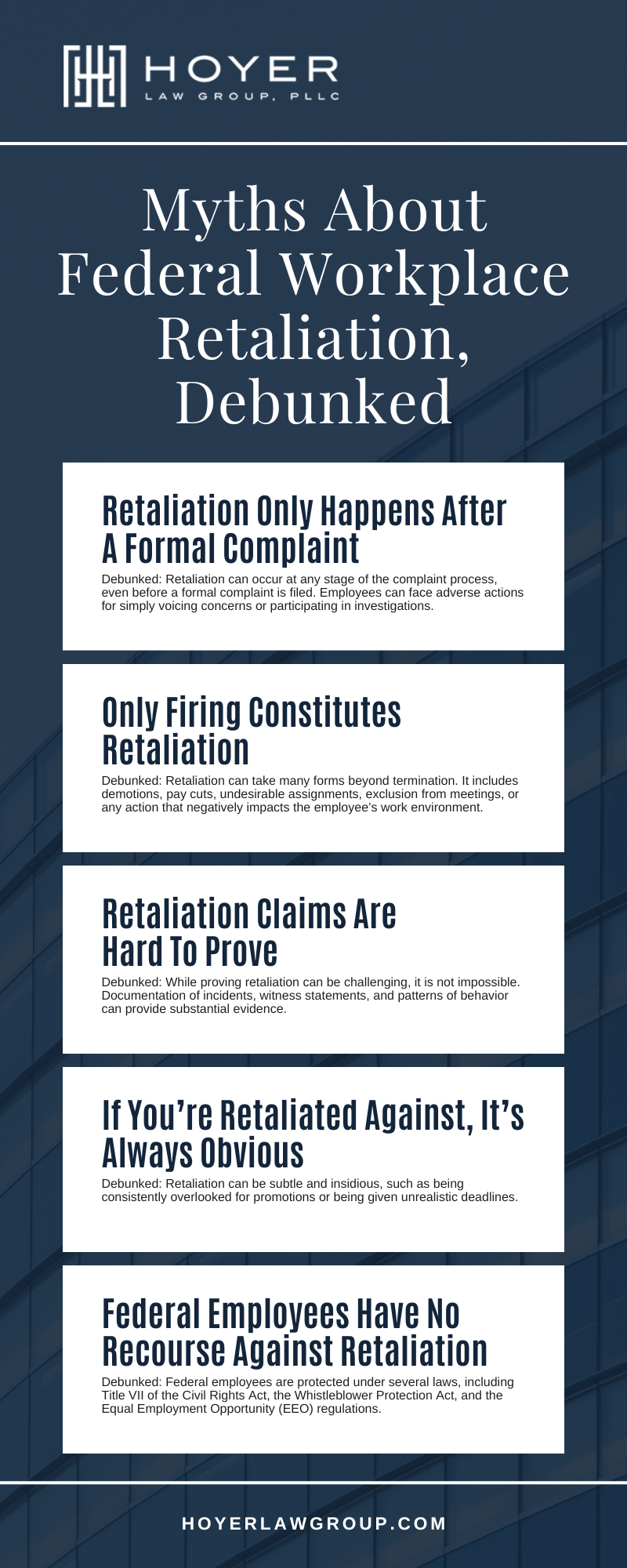Washington D.C. Federal Workplace Retaliation Lawyer
We all deserve to have a workplace free of hostility. However, even with all the laws and statutes in place to protect workers from harassment and discrimination, unfair treatment still happens. If it’s happened to you, you could benefit from legal advice from a Washington, D.C., federal workplace retaliation lawyer. Reporting the incidents to your employer may not be enough to stop the harassment – and in fact, some employers would rather “get rid” of the squeaky wheel than solve the problem. Are you facing retaliation from a federal employer for filing a valid discrimination or harassment claim? Contact Hoyer Law Group to speak with an employment attorney about your options.

Retaliation Is Illegal – Hold Your Employer To Justice
At Hoyer Law Group, our legal team is dedicated to righting wrongs in the workplace. If you’ve faced discrimination, harassment, or other unfair treatment, then you have rights, and our Washington, D.C., federal workplace retaliation lawyers are by your side to protect them. You may have trouble discerning discrimination. Some people may think they’re overthinking certain behaviors or maybe being “too sensitive.” If you filed a complaint about discrimination or harassment and the behaviors didn’t stop, you have the right to report your employer (and anyone involved) to the Equal Employment Opportunity Commission (EEOC). This is a federal agency tasked with investigating discrimination in the workplace. It established certain “protected classes” and forbids employers from making decisions in hiring, promotions or transfers, and termination based on an individual’s identification with a protected class. It also details consequences if an employer retaliates against a complaining employee.
What Is Retaliation
Retaliation is when an employer takes action against you for filing a complaint. This could include demoting you or moving you to another department in a transfer you didn’t want. Or, you could be assigned to a less desirable role or sales territory. You could also be terminated. Your employer is forbidden by federal law from firing you for making a complaint about your working conditions or treatment. Most employers know this, so they may list vague reasons for termination instead of the fact that you were fired for making a complaint.
You Have Rights – A Washington D.C. Federal Workplace Retaliation Lawyer Protects Them
Your attorney’s role includes investigating the reasons behind your change in role or employment status to determine if it was unfounded. They can also investigate the employer themselves, looking for patterns of discrimination or permitting a hostile working environment.
If you have been unfairly treated, demoted, or fired, you have the right to file a lawsuit against your employer. You can pursue compensation for lost wages, reduced earning potential, and the emotional trauma you experienced. Filing a lawsuit can be tricky without the right legal advice. Trust our legal team to thoroughly investigate your case, properly value your claim, and develop a strong argument on your behalf. Contact Hoyer Law Group today to speak with a skilled employment lawyer.
Understanding Federal Workplace Retaliation
In today’s professional environment, the importance of understanding your rights as an employee is paramount, especially regarding federal workplace retaliation. When employees face adverse actions for participating in legally protected activities, it becomes essential to seek knowledgeable legal assistance. This is where a specialized Washington D.C. federal workplace retaliation lawyer from Hoyer Law Group, PLLC’s role becomes crucial.
Recognizing Retaliatory Actions
Federal workplace retaliation can take many forms, and understanding these is crucial for employees. For example, an employee who reports safety violations might suddenly receive unwarranted negative performance reviews, be excluded from meetings, or have their job duties changed in a way that negatively impacts their career. Recognizing these subtle forms of retaliation is important because they can be as damaging as more overt actions like demotion or termination.
Understanding Legal Protections
Federal employees are protected from retaliation under various laws, including the Whistleblower Protection Act and Title VII of the Civil Rights Act. These laws ensure that employees can report misconduct without fear of adverse consequences. For instance, if an employee in a federal agency discloses misuse of government funds, the law protects them from being demoted or fired as a result of their disclosure. Understanding these protections helps employees know their rights and seek appropriate remedies if retaliated against.
Knowing How to Document Retaliation
Proper documentation is key to proving retaliation. Employees should keep detailed records of any incidents that they believe are retaliatory. For example, if an employee who filed a discrimination complaint starts receiving written warnings for minor infractions that were previously overlooked, they should document these warnings along with any related emails or memos. This documentation can be critical evidence in a retaliation claim.
Learning from Case Studies
Reviewing real-life case studies can provide valuable insights into how retaliation claims are handled. For example, a case where a federal employee successfully challenged their employer’s retaliatory actions can illustrate the process and outcomes. These case studies often highlight the importance of legal representation and the types of evidence that are effective in proving retaliation.
Seeking Professional Advice
Consulting with a federal workplace retaliation lawyer can help employees understand their situation and options. For instance, a lawyer can explain how to file a complaint with the EEOC or the Office of Special Counsel and what to expect during the investigation process. Legal advice can clarify complex legal terms and ensure that employees take the right steps to protect their rights.
Understanding federal workplace retaliation involves recognizing retaliatory behaviors, knowing legal protections, documenting incidents properly, learning from real cases, and seeking professional legal advice. This knowledge empowers employees to stand up against retaliation and seek justice effectively.
The Role Of A Specialized Lawyer In Handling Retaliation Cases
A lawyer with experience in this field brings a deep understanding of the complexities surrounding federal workplace laws and regulations. Their skill in navigating these cases is invaluable in ensuring employees’ rights are protected and upheld. These attorneys are skilled in dissecting the nuances of each case, providing personalized legal strategies tailored to individual circumstances.
Key Strategies In Proving Retaliation In The Workplace
While every case is unique, there are several common strategies employed by lawyers in these situations. These include a thorough investigation to gather evidence, expert witness testimonies, detailed documentation of all workplace interactions, and a strong understanding of federal laws and precedents. The aim is to build a robust case demonstrating the link between the protected activity and the adverse employment action.
Importance Of Evidence And Documentation
Gathering concrete evidence is a critical step in proving retaliation. This involves meticulously documenting all relevant interactions, communications, and events in the workplace. A proficient Washington D.C. federal workplace retaliation lawyer will guide clients through this process, ensuring that all pertinent information is accurately and comprehensively recorded.
Utilizing Legal Precedents And Regulations
An attorney’s expertise extends to a deep knowledge of relevant laws and historical legal precedents. They adeptly apply this knowledge to each case, providing context and weight to the claims. Understanding the intricacies of federal laws and how they apply to specific situations is a key component of building a strong case.
Personalized Legal Strategies
Every case of workplace retaliation has its unique aspects. A skilled attorney recognizes this and tailors their approach accordingly. They provide personalized legal counsel, adapting their strategies to suit the specific details and nuances of each case. This bespoke approach is fundamental in effectively representing clients and upholding their rights.
The Journey Towards Justice And Fairness
Navigating a federal workplace retaliation case can be a challenging journey. It requires not only legal acumen but also a compassionate understanding of the client’s situation. Attorneys in this field are committed to guiding clients through the legal process, offering support and expertise every step of the way.
10 Myths About Federal Workplace Retaliation, Debunked
Workplace retaliation is a serious issue that affects many employees in the federal sector. Unfortunately, there are numerous myths surrounding this topic that can lead to misunderstandings and prevent victims from seeking the help they need from an experienced Washington D.C., federal workplace retaliation lawyer. At Hoyer Law Group, PLLC, we aim to dispel common myths standing between you and demanding the fair treatment you deserve.
1. Myth: Retaliation Only Happens After A Formal Complaint
Debunked: Retaliation can occur at any stage of the complaint process, even before a formal complaint is filed. Employees can face adverse actions for simply voicing concerns or participating in investigations.
2. Myth: Only Firing Constitutes Retaliation
Debunked: Retaliation can take many forms beyond termination. It includes demotions, pay cuts, undesirable assignments, exclusion from meetings, or any action that negatively impacts the employee’s work environment.
3. Myth: Retaliation Claims Are Hard To Prove
Debunked: While proving retaliation can be challenging, it is not impossible. Documentation of incidents, witness statements, and patterns of behavior can provide substantial evidence.
4. Myth: If You’re Retaliated Against, It’s Always Obvious
Debunked: Retaliation can be subtle and insidious, such as being consistently overlooked for promotions or being given unrealistic deadlines.
5. Myth: Federal Employees Have No Recourse Against Retaliation
Debunked: Federal employees are protected under several laws, including Title VII of the Civil Rights Act, the Whistleblower Protection Act, and the Equal Employment Opportunity (EEO) regulations.
6. Myth: Only Supervisors Can Retaliate
Debunked: While supervisors are commonly involved in retaliation cases, coworkers can also engage in retaliatory behaviors. For instance, some of your coworkers might ostracize or bully you for reporting misconduct, or your manager may turn a blind eye toward your mistreatment.
7. Myth: Filing A Retaliation Claim Will Make Things Worse
Debunked: Although fear of further retaliation is valid, federal laws are in place to protect employees who file complaints.
8. Myth: Retaliation Claims Are Just About Getting Money
Debunked: Retaliation claims are about seeking justice and stopping unlawful behavior. While financial compensation can be a part of the resolution, the primary goal is often to address the wrongs done and prevent future occurrences.
9. Myth: If You Didn’t Lose Your Job, It’s Not Retaliation
Debunked: Retaliation does not require job loss to be valid. Any adverse action that would deter a reasonable person from engaging in protected activity can constitute retaliation. This includes things like job transfers, reduction in duties, or even verbal harassment.
10. Myth: Retaliation Stops Once You Leave the Job
Debunked: Retaliation can continue even after an employee leaves their job. This can include blacklisting, providing negative references, or other actions that impact the former employee’s ability to secure new employment.
Federal Workplace Retaliation Infographic

FAQs about Federal Workplace Retaliation in Washington, D.C.
What constitutes workplace retaliation under federal law?
Workplace retaliation under federal law occurs when an employer takes adverse action against an employee for engaging in legally protected activities. These activities can include filing a complaint about discrimination or harassment, participating in an investigation, or whistleblowing about illegal practices. Adverse actions can range from demotion, termination, or salary reduction to more subtle forms like increased scrutiny, negative performance reviews, or exclusion from projects. The key aspect of retaliation is the causal link between the protected activity and the adverse action, which federal laws like Title VII of the Civil Rights Act and the Whistleblower Protection Act are designed to prevent and address.
What protections do federal employees have against workplace retaliation in Washington, D.C.?
Federal employees in Washington, D.C. are protected against workplace retaliation by a variety of laws, including the Whistleblower Protection Act (WPA), Title VII of the Civil Rights Act, and the Equal Employment Opportunity Commission (EEOC) guidelines. These protections ensure that federal employees can report misconduct, discrimination, or other illegal activities without fear of reprisal. The WPA specifically safeguards employees who disclose information they reasonably believe evidences a violation of law, gross mismanagement, gross waste of funds, an abuse of authority, or a substantial and specific danger to public health or safety. If retaliation occurs, employees have the right to file a complaint and seek remedies, including reinstatement and compensation for damages.
How can a federal workplace retaliation lawyer assist employees in Washington, D.C.?
A federal workplace retaliation lawyer in Washington, D.C. can provide critical assistance to employees facing retaliation. These legal experts help employees understand their rights, gather necessary evidence, and navigate the complexities of filing a complaint with the appropriate federal agencies, such as the EEOC or the Office of Special Counsel (OSC). They can also represent employees in negotiations and hearings, and if necessary, litigate cases in federal court. By leveraging their expertise, these lawyers aim to secure favorable outcomes for their clients, including remedies like reinstatement, back pay, and compensation for emotional distress.
What steps should an employee take if they believe they are a victim of workplace retaliation?
If an employee believes they are a victim of workplace retaliation, the first step is to document all instances of the alleged retaliation, including dates, times, and details of the adverse actions. They should also gather any relevant communications, such as emails or memos, and identify any witnesses. Next, the employee should report the retaliation to their employer’s human resources department or the relevant federal agency. Consulting with a federal workplace retaliation lawyer is crucial to understand the legal options and to ensure the complaint is properly filed. Timely action is important, as there are strict deadlines for filing retaliation claims.
What are the potential outcomes of a federal workplace retaliation case in Washington, D.C.?
The potential outcomes of a federal workplace retaliation case in Washington, D.C. can vary depending on the specifics of the case and the evidence presented. Successful claims can result in a range of remedies, including reinstatement to the employee’s former position, back pay for lost wages, compensatory damages for emotional distress, and reimbursement of legal fees. In some cases, punitive damages may also be awarded to punish particularly egregious conduct by the employer. Additionally, corrective actions might be mandated to prevent future retaliation. Each case is unique, and a skilled federal workplace retaliation lawyer can help navigate the process to achieve the best possible outcome for the employee.
Getting Legal Help To End Workplace Retaliation
Have you reported workplace harassment only to find yourself on the receiving end of workplace retaliation? Do you need help getting justice and holding the perpetrator accountable? Going up against a federal employer can be overwhelming, but with the help of the attorneys at Hoyer Law Group, PLLC., you’re not alone. Contact us today for a confidential consultation with a skilled Washington D.C. federal workplace retaliation lawyer.
Contact A Lawyer
If you believe you are a victim of federal workplace retaliation, it is crucial to seek professional legal assistance promptly. Protecting your rights and ensuring justice requires the expertise and guidance of a Washington D.C. federal workplace retaliation lawyer. Reach out to our law firm today to schedule a consultation and take the first step towards safeguarding your professional rights and career.




